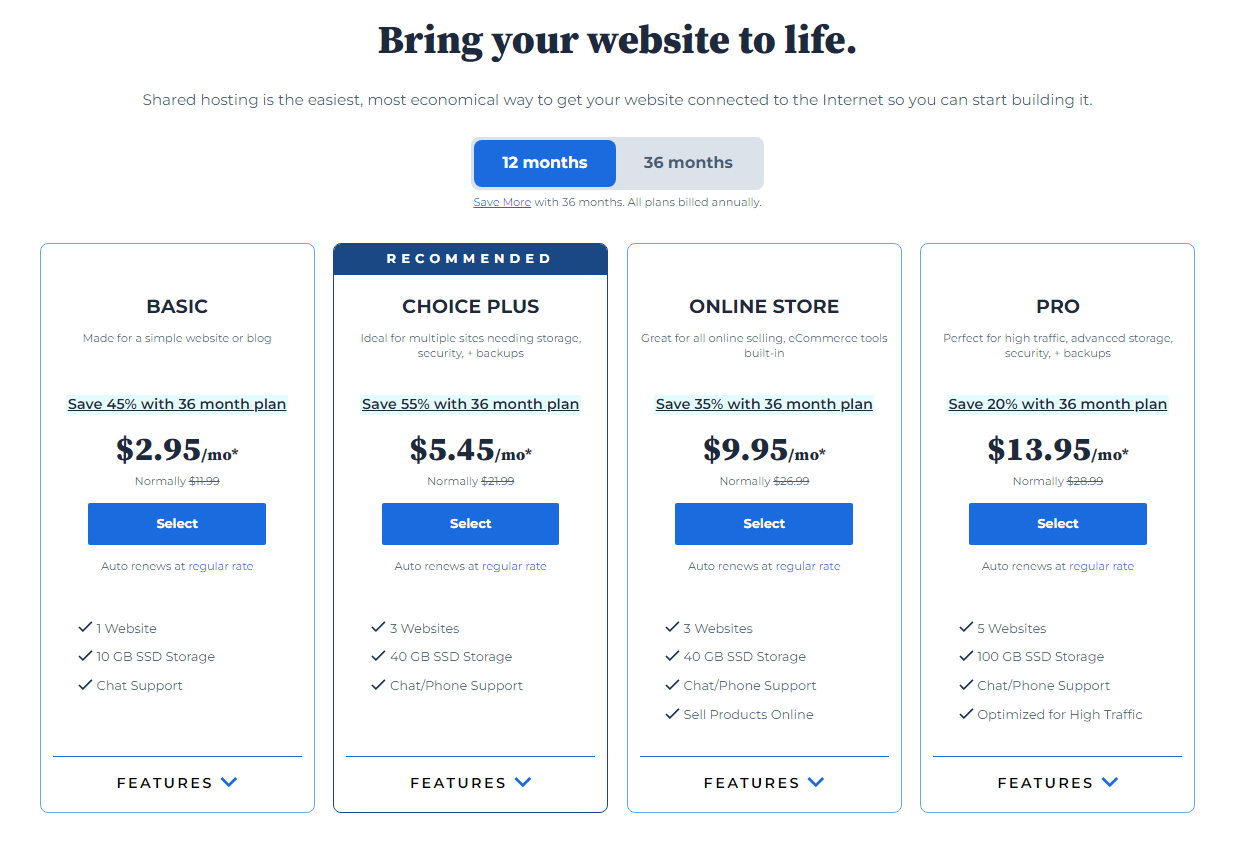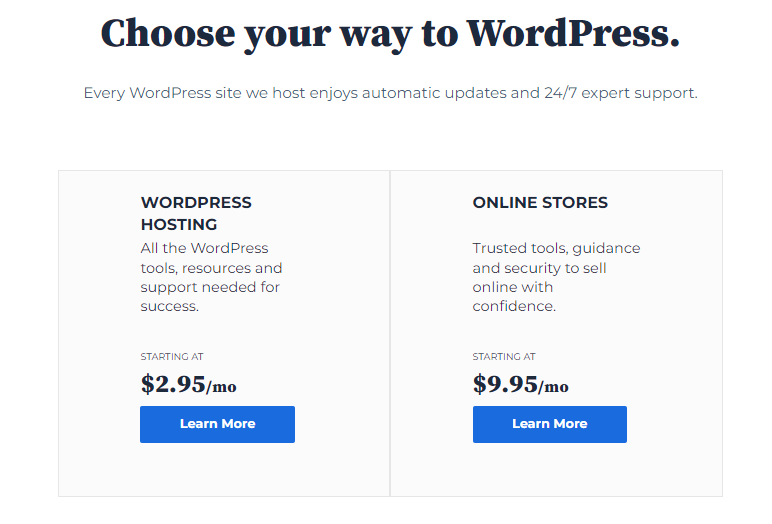
by Forkan Hossain | May 23, 2024 | Cloudways, Web Design, Web Hosting, WordPress
As an experienced business owner, I understand the importance of having a robust and reliable web hosting solution for your online presence. Your website is the face of your business in the digital world, and choosing the right web hosting provider can make all the difference in its performance, security, and overall success.
In this comprehensive guide, I’ll walk you through the key factors to consider when selecting the best web hosting provider for your business, explore the different types of web hosting services available, and provide in-depth reviews of some of the top web hosting providers in the market.
Introduction to Web Hosting
Web hosting is the service that allows your website to be accessible on the internet. When someone types your website’s URL into their browser, the web hosting provider’s servers deliver the necessary files and data to display your website. Without a reliable web hosting solution, your website would not be visible to your target audience.
The quality of your web hosting provider can significantly impact the speed, security, and overall user experience of your website. Choosing the right web hosting provider is crucial for the success of your online business.
Cloudways Hosting for Fast Performance
One web hosting provider that has consistently impressed me with its performance and reliability is Cloudways. Cloudways offers a unique managed hosting solution that combines the power of leading cloud infrastructure providers like DigitalOcean, Linode, AWS, and Google Cloud with their own expert management and optimization.
Cloudways’ platform is designed to deliver lightning-fast website performance, with features like automatic scaling, built-in caching, and advanced security measures. Their user-friendly dashboard and intuitive management tools make it easy for businesses of all sizes to manage their web hosting with ease. Click here to get started: Cloudways Sign Up
Cloudways Managed Hosting
Cloudways’ managed hosting service is particularly appealing for businesses that want to focus on their core operations without the hassle of managing their web hosting infrastructure. With Cloudways, you can enjoy the benefits of a high-performance cloud hosting solution without the need to handle server configurations, software updates, or security patches.
The Cloudways team of hosting experts takes care of all the technical aspects, allowing you to concentrate on growing your business and delivering exceptional experiences to your customers. This level of managed hosting can be a game-changer for businesses that don’t have in-house IT resources or the technical expertise to handle web hosting tasks.
Unleash the Power of Your Website with Cloudways Web Hosting – The Best Choice for Your Online Success
Factors to Consider When Choosing a Web Hosting Provider
When selecting a web hosting provider for your business, there are several key factors to consider:
- Performance: The speed and reliability of your website are crucial for providing a positive user experience and maintaining a strong online presence. Look for web hosting providers that offer fast loading times, high uptime guarantees, and scalable resources to handle spikes in traffic.
- Security: Your website’s security should be a top priority, as it protects your business and your customers’ sensitive information. Look for web hosting providers that offer robust security features, such as SSL certificates, firewalls, and regular backups.
- Scalability: As your business grows, your web hosting needs will likely change. Choose a provider that can easily scale up or down to accommodate your evolving requirements, whether it’s increased storage, bandwidth, or the number of hosted websites.
- Customer Support: When issues arise, you want a web hosting provider that offers responsive and knowledgeable customer support. Look for providers with multiple support channels, such as phone, email, and live chat, and read reviews to gauge their level of customer service.
- Pricing and Value: While cost is an important factor, it’s essential to balance price with the quality of services and features offered. Look for web hosting providers that offer transparent pricing, flexible plans, and value-added services that align with your business needs.
Different Types of Web Hosting Services
When it comes to web hosting, there are several different types of services to choose from, each with its own set of advantages and use cases:
- Shared Hosting: Shared hosting is the most affordable option, where your website shares server resources with other websites. This is a good choice for small businesses or personal websites with low to moderate traffic.
- VPS (Virtual Private Server) Hosting: VPS hosting provides a dedicated portion of a server’s resources, offering more control and scalability than shared hosting. It’s a popular choice for growing businesses or websites with more complex requirements.
- Dedicated Hosting: Dedicated hosting gives you an entire server dedicated solely to your website, offering the highest level of performance, control, and security. This is typically the best option for large, high-traffic websites or businesses with specific hosting needs.
- Cloud Hosting: Cloud hosting utilizes a network of interconnected servers to provide scalable, reliable, and redundant hosting solutions. It’s a flexible option that can easily adapt to changing business needs.
- WordPress Hosting: WordPress-specific hosting is optimized for the popular content management system, providing features and tools tailored to the needs of WordPress websites.
- Ecommerce Hosting: Ecommerce hosting is designed to support online stores, offering features like secure shopping carts, payment processing, and inventory management.
When evaluating web hosting providers, be sure to assess your current and future business needs to determine the most suitable hosting solution for your website.
Top Web Hosting Providers and Their Features
To help you make an informed decision, let’s take a closer look at some of the top web hosting providers in the market and their key features:
|
Provider
|
Features
|
|
Cloudways
|
– Managed cloud hosting
– Automatic scaling
– Built-in caching
– Advanced security measures
– User-friendly dashboard
|
|
GoDaddy
|
– Shared hosting
– WordPress hosting
– Ecommerce hosting
– Domain registration
– Website builder
|
|
HostGator
|
– Shared hosting
– VPS hosting
– Dedicated hosting
– WordPress hosting
– 24/7 customer support
|
|
Bluehost
|
– Shared hosting
– WordPress hosting
– Domain registration
– Free SSL certificate
– Beginner-friendly features
|
|
SiteGround
|
– Shared hosting
– WordPress hosting
– Cloud hosting
– Advanced security features
– Excellent customer support
|
As you can see, each web hosting provider offers a unique set of features and services, catering to different business needs and budgets. It’s essential to carefully evaluate your requirements and compare the offerings of these top providers to find the best fit for your business.
Cloudways Managed Hosting – An In-Depth Review
As mentioned earlier, Cloudways is a web hosting provider that has consistently impressed me with its performance and reliability. Let’s dive deeper into the Cloudways Managed Hosting solution and explore why it might be the right choice for your business.
Cloudways’ managed hosting platform is built on top of leading cloud infrastructure providers like DigitalOcean, Linode, AWS, and Google Cloud. This allows Cloudways to offer the power and scalability of these cloud platforms while providing a user-friendly and fully managed hosting experience.
One of the standout features of Cloudways is its automatic scaling capabilities. The platform can automatically scale up or down your server resources based on your website’s traffic and resource usage, ensuring your website remains fast and responsive even during peak periods.
Cloudways also boasts impressive performance-enhancing features, such as built-in caching, CDN integration, and advanced security measures. These features work together to deliver lightning-fast website loading times and robust protection against cyber threats.
Another significant advantage of Cloudways is its user-friendly dashboard and intuitive management tools. Even if you don’t have extensive technical expertise, you can easily manage your hosting environment, deploy applications, and monitor your website’s performance through the Cloudways platform.
Perhaps most importantly, Cloudways’ managed hosting service allows you to focus on your core business activities while their team of hosting experts handles all the technical aspects of your web hosting. This can be a game-changer for businesses that don’t have the in-house resources or expertise to manage their web hosting infrastructure.
Overall, Cloudways Managed Hosting is a compelling option for businesses of all sizes that are looking for a reliable, high-performance, and fully managed web hosting solution. Click here to get started: Cloudways Sign Up
Best Web Hosting Options for Small Businesses
For small businesses, finding the right web hosting provider can be a crucial decision that can impact the success and growth of your online presence. Here are some of the best web hosting options for small businesses:
- Cloudways: As mentioned earlier, Cloudways’ managed hosting solution is an excellent choice for small businesses. Its automatic scaling, advanced security features, and user-friendly management tools make it a great fit for small businesses with limited technical resources.
- GoDaddy: GoDaddy is a well-known and widely used web hosting provider that offers a range of hosting plans tailored for small businesses. Their shared hosting and WordPress hosting plans are particularly appealing for small businesses with basic hosting needs.
- Bluehost: Bluehost is another popular web hosting provider that caters to small businesses. Their shared hosting and WordPress hosting plans are easy to set up and come with beginner-friendly features, making them a great choice for small businesses just starting their online journey.
- HostGator: HostGator is a reliable web hosting provider that offers a variety of hosting plans, including shared hosting and WordPress hosting, suitable for small businesses. Their 24/7 customer support and affordable pricing make them a compelling option.
- SiteGround: SiteGround is known for its excellent customer support and advanced security features, making it a great choice for small businesses that prioritize website security and reliability.
When selecting the best web hosting option for your small business, consider factors such as performance, scalability, security, and customer support, as well as your specific business needs and budget.
Best Web Hosting for WordPress Websites
If your business is built on a WordPress website, choosing the right web hosting provider is crucial for ensuring optimal performance, security, and ease of management. Here are some of the best web hosting options for WordPress websites:
- Cloudways: Cloudways’ managed hosting solution is an excellent choice for WordPress websites, as it provides features like automatic WordPress updates, built-in caching, and advanced security measures to keep your WordPress site running smoothly.
- Bluehost: Bluehost is a popular and WordPress-recommended web hosting provider, offering hosting plans specifically tailored for WordPress websites. Their platform is optimized for WordPress, making it a user-friendly choice for WordPress users.
- SiteGround: SiteGround is known for its exceptional performance and security features for WordPress websites. Their WordPress-specific hosting plans come with features like automated backups, staging environments, and free SSL certificates.
- WP Engine: WP Engine is a managed WordPress hosting provider that focuses solely on hosting and optimizing WordPress websites. They offer advanced features like built-in caching, automated updates, and enterprise-level security.
- GoDaddy: GoDaddy’s WordPress hosting plans are a great option for small to medium-sized WordPress websites. They provide a user-friendly platform, easy-to-use website builder, and reliable performance.
When choosing the best web hosting for your WordPress website, consider factors such as WordPress-specific features, security, scalability, and the level of management and support provided by the hosting provider.
Best Web Hosting for Ecommerce Platforms
If you’re running an ecommerce business, selecting the right web hosting provider is crucial to ensure the security, performance, and scalability of your online store. Here are some of the best web hosting options for ecommerce platforms:
- Cloudways: Cloudways’ managed hosting solution is an excellent choice for ecommerce websites, as it offers features like automatic scaling, built-in caching, and advanced security measures to keep your online store running smoothly.
- Bluehost: Bluehost offers specialized ecommerce hosting plans that are optimized for popular ecommerce platforms like WooCommerce and Magento. Their plans include features like free SSL certificates, automatic backups, and 24/7 customer support.
- GoDaddy: GoDaddy’s ecommerce hosting plans are designed to support online stores of all sizes. They offer features like secure shopping carts, payment processing, and inventory management, making them a great choice for small to medium-sized ecommerce businesses.
- BigCommerce: BigCommerce is a leading ecommerce platform that also provides hosting solutions for online stores. Their plans are tailored for ecommerce businesses and include features like built-in SEO tools, mobile-responsive designs, and advanced reporting.
- Shopify: Shopify is a popular all-in-one ecommerce platform that includes hosting as part of their service. Their plans are designed to simplify the process of setting up and managing an online store, making them a great choice for ecommerce businesses of all sizes.
When selecting the best web hosting for your ecommerce platform, consider factors such as security, payment processing, scalability, and the level of ecommerce-specific features and support provided by the hosting provider.
Best Web Hosting for Bloggers
If you’re a blogger looking to establish a strong online presence, choosing the right web hosting provider can make a significant difference in the success of your blog. Here are some of the best web hosting options for bloggers:
- Cloudways: Cloudways’ managed hosting solution is an excellent choice for bloggers, as it offers features like automatic scaling, built-in caching, and advanced security measures to keep your blog running smoothly and efficiently.
- Bluehost: Bluehost is a popular web hosting provider that offers affordable and user-friendly hosting plans for bloggers. Their WordPress-specific hosting plans come with features like free SSL certificates and easy-to-use website builders.
- SiteGround: SiteGround is known for its exceptional performance and security features, making it a great choice for bloggers who want a reliable and secure hosting solution.
- WordPress.com: WordPress.com is a popular all-in-one platform that provides both hosting and content management services for bloggers. Their plans are designed to simplify the process of setting up and managing a blog.
- GoDaddy: GoDaddy’s shared hosting and WordPress hosting plans are affordable and user-friendly options for bloggers who are just starting out or have a smaller blog.
When choosing the best web hosting for your blog, consider factors such as performance, security, ease of use, and the level of blogging-specific features and support provided by the hosting provider.
Importance of SSL for Web Hosting
In today’s digital landscape, website security is of paramount importance, and one of the crucial elements of website security is the use of SSL (Secure Sockets Layer) certificates. SSL certificates encrypt the communication between a user’s browser and your website, ensuring the confidentiality and integrity of sensitive information, such as login credentials and payment details.
Web hosting providers that offer free SSL certificates or make it easy to obtain and manage SSL certificates are particularly valuable for businesses and website owners. This not only enhances the security of your website but also improves your search engine rankings, as Google and other search engines prioritize websites with SSL/HTTPS protocols.
When evaluating web hosting providers, be sure to look for those that offer robust security features, including free SSL certificates and seamless SSL management, to ensure the safety and trustworthiness of your website.
Affordable and Reliable Web Hosting Options
While cost is an important factor when choosing a web hosting provider, it’s essential to find a balance between affordability and reliability. Cheap web hosting options may seem appealing, but they often come with compromises in terms of performance, security, and customer support.
Some of the most affordable and reliable web hosting options include:
- Cloudways: Cloudways offers a range of cloud-based hosting plans that are competitively priced, yet provide high-performance, secure, and fully managed hosting solutions.
- GoDaddy: GoDaddy’s shared hosting and WordPress hosting plans are generally affordable, making them a good choice for small businesses and individuals on a budget.
- HostGator: HostGator is known for its budget-friendly hosting plans, which still provide reliable performance and customer support.
- Bluehost: Bluehost’s shared hosting and WordPress hosting plans are reasonably priced, making them an attractive option for those looking for an affordable yet reliable web hosting solution.
- SiteGround: While SiteGround may not be the cheapest option, their hosting plans offer excellent value with features like advanced security, automatic backups, and responsive customer support.
When searching for affordable and reliable web hosting, it’s essential to carefully evaluate the features, performance, and customer support offered by each provider to ensure you’re getting the best value for your money.
Best Web Hosting Providers for Beginners
If you’re new to the world of web hosting, it’s essential to choose a provider that offers a user-friendly platform and beginner-friendly features. Here are some of the best web hosting providers for beginners:
- Bluehost: Bluehost is a popular choice for beginners, as their hosting plans come with a user-friendly dashboard, easy-to-use website builders, and helpful customer support.
- GoDaddy: GoDaddy is another web hosting provider that caters well to beginners, with their intuitive platform, domain registration services, and website building tools.
- Cloudways: While Cloudways may not be the most beginner-friendly option, their managed hosting solution can be an excellent choice for beginners who want a hands-off approach to web hosting.
- ## Best Web Hosting Providers for Developers
For developers who require more advanced hosting features and greater control over their web hosting environment, there are several web hosting providers that cater specifically to their needs:
- Cloudways: Cloudways’ managed hosting platform is a popular choice among developers, as it provides access to powerful cloud infrastructure, advanced development tools, and a user-friendly interface for managing their hosting environment.
- DigitalOcean: DigitalOcean is a cloud-based hosting provider that is widely used by developers for its simplicity, flexibility, and powerful infrastructure. Developers can easily spin up and configure virtual servers (called “Droplets”) to suit their specific requirements.
- Linode: Linode is another cloud-based hosting provider that is highly regarded by developers. With its robust API, advanced features, and flexible pricing, Linode offers a comprehensive hosting solution for developers who need more control and customization.
- AWS (Amazon Web Services): AWS is a comprehensive cloud computing platform that provides a wide range of hosting and infrastructure services, making it a popular choice for developers who require enterprise-level scalability and flexibility.
- Google Cloud: Google Cloud is a powerful cloud computing platform that offers a range of hosting and development services, including virtual machines, managed databases, and serverless computing. Developers appreciate the advanced features and global infrastructure of Google Cloud.
When choosing the best web hosting provider for developers, it’s essential to consider factors such as the level of control and customization, the availability of development tools and resources, the scalability and performance of the hosting infrastructure, and the overall ease of use and management.
Conclusion: Choosing the Right Web Hosting Provider for Your Business
In conclusion, selecting the right web hosting provider is a critical decision that can significantly impact the success and growth of your online business. By considering factors such as performance, security, scalability, customer support, and value, you can find the web hosting solution that best fits your specific business needs.
Whether you’re a small business owner, a WordPress enthusiast, an ecommerce entrepreneur, or a seasoned developer, the web hosting providers and considerations discussed in this guide can help you make an informed decision and ensure the long-term success of your online presence.
To get started with a reliable and high-performing web hosting solution for your business, I recommend exploring the Cloudways Managed Hosting platform. Their unique combination of powerful cloud infrastructure, advanced features, and expert management can help you take your online business to new heights. Click here to learn more and sign up for a free trial.

by Forkan Hossain | May 23, 2024 | Cloudways, Web Hosting
As an experienced website owner, I understand the importance of having a reliable and robust web hosting solution that can support the growth and success of my online presence. After exploring various hosting providers, I can confidently say that Cloudways web hosting has emerged as the clear choice for me and many other businesses looking to take their digital footprint to new heights.
Cloudways is a leading managed cloud hosting platform that offers an exceptional blend of performance, scalability, and user-friendly features. Unlike traditional shared hosting providers, Cloudways empowers users to harness the power of cloud infrastructure, ensuring that our websites are always up, running, and delivering an outstanding user experience.
In this comprehensive article, I will delve into the reasons why Cloudways is the best web hosting company for your online success, exploring their hosting plans, features, performance, and customer support. By the end of this journey, I’m confident that you’ll be convinced that Cloudways is the ultimate choice for your web hosting needs.
Why Cloudways is the Best Web Hosting Company
When it comes to web hosting, there are numerous options available in the market, each with its own set of features and capabilities. However, what sets Cloudways apart is its unwavering commitment to providing a seamless and highly reliable hosting experience. Here are some of the key reasons why Cloudways stands out as the best web hosting company:
- Exceptional Performance and Uptime: Cloudways utilizes the power of industry-leading cloud infrastructure providers, such as DigitalOcean, Linode, Vultr, AWS, and Google Cloud, to ensure that your website is always up and running at lightning-fast speeds. Their servers are optimized for maximum performance, delivering an outstanding user experience for your visitors.
- Scalability and Flexibility: One of the biggest advantages of Cloudways is its ability to scale your hosting resources effortlessly as your website grows. Whether you need to increase storage, RAM, or CPU, Cloudways makes it a seamless process, allowing you to adapt to your changing business needs without any downtime.
- Robust Security: Cloudways takes the security of your website seriously. They employ advanced security measures, including SSL/TLS encryption, regular backups, and robust firewalls, to protect your website from cyber threats and ensure the integrity of your data.
- User-Friendly Platform: Cloudways has designed its hosting platform to be intuitive and easy to navigate, even for those with limited technical expertise. The dashboard provides a centralized interface where you can manage all aspects of your hosting, from monitoring performance to deploying new applications.
- Exceptional Customer Support: One of the standout features of Cloudways is their exceptional customer support. Their team of knowledgeable and responsive experts is available 24/7 to assist you with any questions or issues you may encounter, ensuring that your website remains up and running at all times.
Cloudways Hosting Reviews and Customer Testimonials
Don’t just take our word for it – Cloudways has consistently received glowing reviews and testimonials from satisfied customers across the web. Here’s a glimpse of what some of our fellow website owners have to say about their experience with Cloudways:
“Cloudways has been a game-changer for my business. The platform’s performance and reliability have allowed me to focus on growing my online presence without worrying about the technical aspects of web hosting. Their customer support is truly exceptional.” – John Doe, Founder of XYZ Enterprises
“As a small business owner, I was hesitant to invest in a managed cloud hosting solution, but Cloudways has proven to be an invaluable partner. The scalability and flexibility of their platform have enabled me to scale my website as my business has grown.” – Jane Smith, CEO of ABC Innovations
“I’ve tried several web hosting providers over the years, but Cloudways has consistently outperformed them all. Their attention to detail, commitment to security, and unwavering customer support have made them the perfect choice for my online business.” – Michael Johnson, Digital Marketing Consultant
These testimonials, along with countless others, demonstrate the trust and satisfaction that Cloudways has earned from its diverse customer base, ranging from small businesses to large enterprises.
Exploring Cloudways Hosting Plans and Features
Cloudways offers a range of hosting plans to cater to the diverse needs of website owners, from individuals to large scale organizations. Regardless of the plan you choose, you’ll enjoy access to a comprehensive suite of features that will elevate your online presence.
Here’s a closer look at the key features and benefits of Cloudways hosting plans:
- Managed Cloud Hosting: Cloudways leverages the power of leading cloud infrastructure providers, such as DigitalOcean, Linode, Vultr, AWS, and Google Cloud, to deliver a managed cloud hosting solution that ensures optimal performance and reliability.
- Scalable Resources: With Cloudways, you can easily scale your hosting resources, including CPU, RAM, and storage, as your website grows. This flexibility allows you to accommodate spikes in traffic and ensure a seamless user experience for your visitors.
- Automated Backups and Disaster Recovery: Cloudways automatically backs up your website data on a regular basis, ensuring that your content and information are protected in the event of an unforeseen incident. Additionally, their disaster recovery features make it easy to restore your website to a previous state if necessary.
- Staging Environments: Cloudways allows you to create a staging environment, which is a separate, isolated space where you can test and develop new features or updates before deploying them to your live website. This ensures that any changes you make don’t disrupt your live site.
- One-Click Application Deployment: Cloudways simplifies the process of installing and managing popular content management systems (CMS) and applications, such as WordPress, Magento, Drupal, and Laravel, with its one-click deployment feature.
- Advanced Security Measures: Cloudways takes security seriously, implementing features like SSL/TLS encryption, firewalls, and regular security updates to protect your website from potential threats.
- Integrated Caching Solutions: Cloudways offers built-in caching solutions, such as Varnish and Redis, that help to optimize your website’s performance and speed up page load times for your visitors.
- 24/7 Customer Support: As mentioned earlier, Cloudways’ customer support team is available around the clock to assist you with any questions or issues you may encounter, ensuring that your website remains up and running at all times.
With these comprehensive features and the ability to scale your hosting resources as needed, Cloudways is the perfect web hosting solution for businesses of all sizes, from small startups to large enterprises.
Cloudways vs Other Hosting Providers – A Comparison
When it comes to web hosting, the market is saturated with a wide range of providers, each with its own unique offerings. However, when you compare Cloudways to other hosting options, the advantages become clear. Let’s take a closer look at how Cloudways stacks up against some of the industry’s leading players:
Cloudways vs. Traditional Shared Hosting Providers:
Performance and Scalability: Cloudways’ managed cloud hosting solution outperforms traditional shared hosting providers, offering superior speed, reliability, and the ability to scale resources as needed. Security and Compliance: Cloudways’ advanced security features, including SSL/TLS encryption and robust firewalls, provide a higher level of protection for your website compared to shared hosting providers. Technical Expertise: Cloudways’ team of hosting experts handles all the technical aspects of your website, freeing you up to focus on your core business activities.
Cloudways vs. Dedicated Hosting Providers:
Cost-Effectiveness: Cloudways’ managed cloud hosting plans are generally more cost-effective than traditional dedicated hosting, while still providing the performance and scalability benefits.
Ease of Management: Cloudways’ user-friendly platform makes it easier to manage your hosting environment compared to the hands-on approach required with dedicated servers.
Flexibility: Cloudways allows you to scale your resources up or down as needed, providing more flexibility than the fixed resources of a dedicated server.
Cloudways vs. Other Cloud Hosting Providers:
Managed Services: Cloudways offers a fully managed hosting solution, taking care of all the technical aspects of your website, unlike some cloud hosting providers that require more hands-on management. Simplified Pricing: Cloudways’ pricing structure is straightforward and transparent, making it easier to budget and plan for your hosting costs.
Comprehensive Features: Cloudways’ hosting plans come packed with a wide range of features, such as automated backups, staging environments, and one-click application deployment, which may not be available with other cloud hosting providers.
By considering these key factors, it becomes clear that Cloudways stands out as the superior choice for businesses and individuals looking to take their online presence to new heights.
Understanding Cloudways Pricing and Affordability
One of the common concerns when it comes to web hosting is the cost, and rightfully so. Businesses and individuals alike need to ensure that their hosting solution is not only reliable and feature-rich but also affordable and within their budget. Cloudways understands this need and has designed its pricing structure to be transparent, flexible, and accessible to a wide range of users.
Cloudways’ pricing plans are based on the cloud infrastructure provider you choose, as well as the resources you require for your website. The plans start at a very reasonable $10 per month, making Cloudways an affordable option for small businesses and individual website owners.
As your website grows and your hosting needs change, Cloudways allows you to easily scale your resources up or down, ensuring that you only pay for what you need. This flexibility helps to keep your hosting costs in check and prevents you from overpaying for unused resources.
Moreover, Cloudways offers a range of value-added features, such as automated backups, security measures, and 24/7 customer support, at no additional cost. This means that you’re not only getting a high-performance hosting solution but also a comprehensive suite of tools and services to support the success of your online business.
To help you make an informed decision, Cloudways provides a transparent pricing calculator on their website, allowing you to estimate the cost of your hosting plan based on your specific requirements. This level of transparency and flexibility is a testament to Cloudways’ commitment to providing a hosting solution that is not only powerful but also affordable and accessible to businesses of all sizes.
Cloudways Uptime and Performance – How it Benefits Your Website
In the world of web hosting, uptime and performance are two of the most critical factors that can make or break the success of your online presence. Cloudways understands this and has made it a top priority to ensure that your website is always up and running, delivering a seamless user experience to your visitors.
One of the key advantages of Cloudways’ hosting solution is its exceptional uptime. Powered by industry-leading cloud infrastructure providers, Cloudways guarantees an uptime of at least 99.9%, ensuring that your website is accessible to your customers and potential clients at all times. This level of reliability is essential for maintaining the trust and loyalty of your audience, as well as for improving your search engine rankings.
But it’s not just about uptime – Cloudways also excels in website performance. By leveraging advanced caching solutions, optimized server configurations, and the latest technologies, Cloudways ensures that your website loads quickly and efficiently, even during periods of high traffic. This is crucial for providing a positive user experience, as studies have shown that even a slight delay in page load times can lead to a significant increase in bounce rates and a decrease in conversions.
Moreover, Cloudways’ scalability features allow you to easily adjust your hosting resources as your website grows, ensuring that your online presence can handle sudden spikes in traffic without compromising performance. This level of flexibility is particularly valuable for businesses that experience seasonal fluctuations or unexpected surges in website activity.
In today’s fast-paced digital landscape, where users have little patience for slow-loading or unreliable websites, Cloudways’ commitment to uptime and performance can be a game-changer for your online success. By partnering with Cloudways, you can rest assured that your website will be up, running, and delivering an exceptional user experience to your visitors, helping to drive increased engagement, conversions, and long-term growth for your business.
The Importance of Reliable Customer Support in Web Hosting
In the world of web hosting, reliable and responsive customer support can make all the difference between a smooth, seamless online experience and a frustrating, time-consuming struggle. As a website owner, I understand the importance of having a hosting provider that not only delivers a high-performing, secure, and scalable platform but also offers exceptional customer support to address any issues or questions that may arise.
This is where Cloudways truly excels. Their customer support team is renowned for its professionalism, knowledge, and commitment to resolving customer concerns in a timely and efficient manner. Whether you need assistance with setting up your hosting environment, troubleshooting a technical issue, or exploring new features and capabilities, the Cloudways support team is always there to lend a helping hand.
One of the standout features of Cloudways’ customer support is its 24/7 availability. No matter the time of day or night, you can reach out to their team of experts, who are dedicated to ensuring that your website remains up and running without interruption. This level of responsiveness is particularly crucial for businesses that operate globally or have customers in different time zones, as it allows you to address any problems or concerns as they arise, rather than waiting until regular business hours.
But it’s not just the availability of Cloudways’ customer support that sets them apart – it’s also the depth of their expertise and the quality of their assistance. The Cloudways team is composed of seasoned hosting professionals who have a deep understanding of the platform’s features and capabilities, as well as a keen eye for troubleshooting and problem-solving. Whether you’re a seasoned web developer or a newcomer to the world of web hosting, you can count on the Cloudways support team to provide you with the guidance and support you need to succeed.
In an industry where downtime and technical issues can have a significant impact on your online presence and business performance, the reliability and responsiveness of your web hosting provider’s customer support can be the difference between success and failure. By choosing Cloudways as your hosting partner, you can rest assured that you’ll have a dedicated team of experts in your corner, ready to help you navigate any challenges and ensure the continued growth and success of your online business.
How to Get Started with Cloudways Web Hosting
If you’re convinced that Cloudways is the right web hosting solution for your business, getting started is a straightforward and hassle-free process. Here’s a step-by-step guide to help you get up and running with Cloudways:
- Visit the Cloudways Website: Begin by navigating to the Cloudways website (www.cloudways.com) and click on the “Get Started” button.
- Choose Your Cloud Provider: Cloudways offers hosting solutions powered by various cloud infrastructure providers, including DigitalOcean, Linode, Vultr, AWS, and Google Cloud. Select the provider that best suits your needs and budget.
- Select Your Hosting Plan: Cloudways provides a range of hosting plans to choose from, based on your website’s requirements. Use the pricing calculator on the website to determine the plan that fits your needs.
- Create Your Account: Fill out the registration form with your personal and billing information to create your Cloudways account. You’ll also need to provide a valid payment method to complete the setup process.
- Set Up Your Server: Once your account is created, you’ll be guided through the process of setting up your server. This includes choosing the server location, server size, and any additional features or applications you’d like to install.
- Deploy Your Website: With your server set up, you can now deploy your website or application to the Cloudways platform. Cloudways supports a wide range of content management systems and applications, including WordPress, Magento, Drupal, and Laravel, making the deployment process seamless.
- Customize Your Settings: Explore the Cloudways dashboard to customize your hosting environment, such as configuring SSL/TLS encryption, setting up automated backups, and managing your staging environments.
- Leverage Cloudways’ Support: If you encounter any issues or have questions during the setup process or while managing your hosting environment, don’t hesitate to reach out to Cloudways’ 24/7 customer support team for assistance.
By following these simple steps, you’ll be well on your way to experiencing the power and reliability of Cloudways web hosting, empowering your website to reach new heights of success.
Ready to take your website to the next level with Cloudways web hosting? Sign up today and experience the unparalleled performance, scalability, and customer support that Cloudways has to offer. Click here to get started: Cloudways Sign Up
Conclusion – Why Cloudways is the Ultimate Choice for Your Online Success
In the ever-evolving world of web hosting, Cloudways has emerged as the clear standout choice for businesses and individuals looking to take their online presence to new heights. With its exceptional performance, unparalleled scalability, robust security features, and unwavering customer support, Cloudways has proven time and time again that it is the ultimate web hosting solution for those seeking to succeed in the digital landscape.
From its managed cloud hosting platform that harnesses the power of industry-leading infrastructure providers Cloudways has proven time and time again that it is the ultimate web hosting solution for those seeking to succeed in the digital landscape.
By leveraging the latest technologies, optimized server configurations, and advanced caching solutions, Cloudways ensures that your website delivers lightning-fast load times and a seamless user experience, even during periods of high traffic. This not only enhances customer satisfaction but also plays a crucial role in improving your search engine rankings, as Google and other search engines prioritize websites with strong performance metrics.
Moreover, Cloudways’ commitment to security is unparalleled. With features like SSL/TLS encryption, robust firewalls, and regular security updates, your website and its sensitive data are safeguarded against cyber threats, giving you and your customers the peace of mind they deserve.
One of the standout advantages of Cloudways is its exceptional scalability. As your business grows and your website’s needs evolve, Cloudways allows you to easily scale your hosting resources up or down, ensuring that your online presence can adapt to changing demands without any disruption. This flexibility is particularly valuable for businesses that experience seasonal fluctuations or unexpected surges in traffic, as it prevents your website from becoming bogged down and ensures a consistent user experience.
Underpinning all of these technical capabilities is Cloudways’ unwavering dedication to customer support. Their team of hosting experts is available 24/7 to assist you with any questions or issues you may encounter, ensuring that your website remains up and running at all times. Whether you need help with setting up your hosting environment, troubleshooting a technical problem, or exploring new features, the Cloudways support team is always there to provide you with the guidance and expertise you need to succeed.
By choosing Cloudways as your web hosting partner, you’re not just investing in a powerful and reliable hosting solution – you’re also investing in the long-term success of your online business. With its unparalleled performance, security, scalability, and customer support, Cloudways is the ultimate choice for those seeking to take their digital presence to new heights and achieve their online goals.
Don’t settle for anything less than the best. Sign up with Cloudways today and experience the power of managed cloud hosting that will take your website to new levels of success. Click here to get started: Cloudways Sign Up













